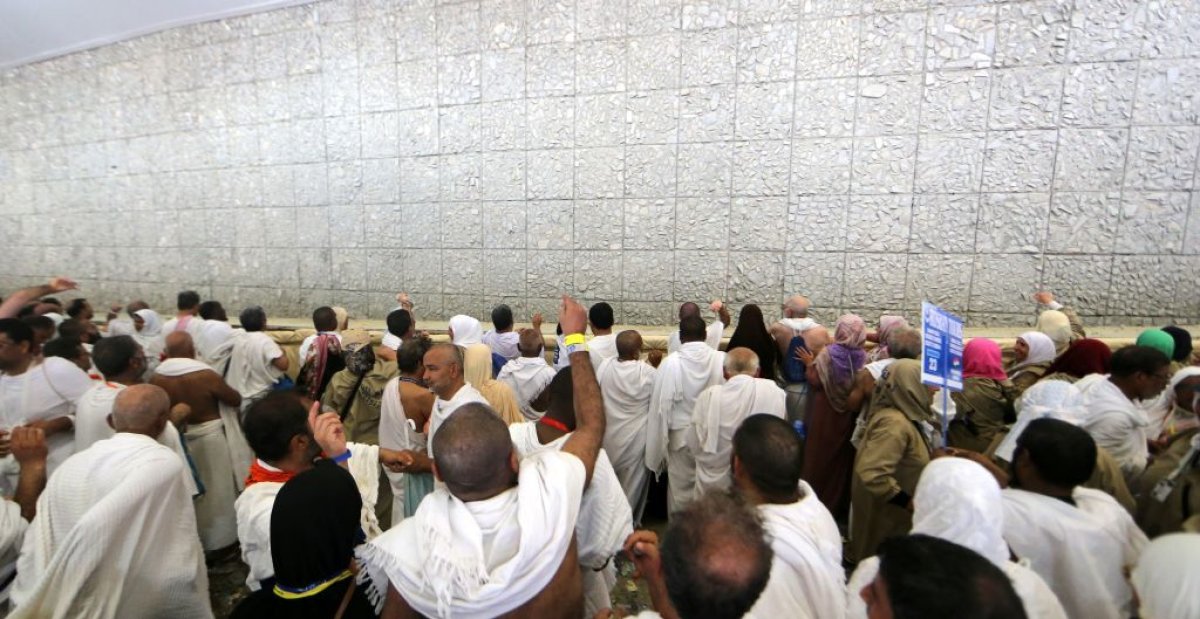Every year, as millions of Muslims travel to Mecca for the annual hajj pilgrimage, they perform a ritual known as "the stoning of the devil."
Throughout the first day of Eid al-Adha, pilgrims who have traveled to Saudi Arabia visit a site in Mina, located close to the sacred city of Mecca. There, the believers, clad in simple white garments, begin throwing small stones from a three-storey high bridge at three walls repeatedly, symbolically attacking Satan with pebbles.
"This is the embodiment of the Prophets Ismail and Ibrahim (Abraham) fighting the devil," Egyptian pilgrim Mohammed al-Jawhiri, 56, explained to Reuters during last year's hajj. "The ritual reveals the extent of the devil's evil and his actions to destroy this world."

The ritual is one of several Muslims perform during their pilgrimage, all of which are intended to retrace the actions and steps performed by Prophet Muhammad in 632 A.D. Companions of the prophet carefully observed the movements of their leader, writing them down later for believers to replicate.
The Prophet Muhammad's actions themselves were meant to represent the trials and struggles of Prophet Abraham – who is also revered by Christians and Jews – and his family. This specific stoning ceremony, according to Muslims, commemorates the actions of Abraham when he was tempted to disobey Allah's (or God's) orders.
Professor Shahul Hameed, an Islamic consultant who previously held the position of president of the Kerala Islamic Mission in Calicut, India, explained the origins of the ritual from the Quran, the holy book of Islam, in an article for About Islam published in 2016.

According to Hameed, God came to Abraham in a vision and commanded him to sacrifice his son Ismail as an offering to demonstrate his loyalty. However, Abraham viewed Ismail as the "promise of future generations, and in a sense, he was the whole world for [him]," the Islamic scholar wrote.
Not wanting to accept the dream and God's command, Abraham at first ignored it altogether. But after having the dream three times, he decided to follow God's wishes. As the story goes, the prophet literally threw stones at the devil, who was tempting him to disobey.
"Prophet Abraham did not yield to the temptation. He chose his love for God over his love for Ismail. He decided to obey God's commandment and sacrifice Ismail," Hameed explained.
Fortunately for Abraham and Ismail, God was merely testing his servant, and he stops the loyal follower before the sacrifice is committed. In commemoration of the test, God then commanded Abraham and his descendants to annually slaughter an animal.

Although some believe that that three walls existing today are actually the devil turned into stone, Hameed argues that there is "no authenticity for the idea." He explained that the three walls (or pillars) in Mina "were constructed recently."
For many non-believers, the story of God asking Abraham to sacrifice his son may be disturbing. However, a different version of the story is also included in the Jewish Torah and the Christian Bible. In the alternative telling, Abraham is asked to sacrifice his son Isaac, not Ismail (or Ishmael). Jews believe they are descended through the lineage of Isaac, while Muslims trace their religious origins through Ismail.
Uncommon Knowledge
Newsweek is committed to challenging conventional wisdom and finding connections in the search for common ground.
Newsweek is committed to challenging conventional wisdom and finding connections in the search for common ground.
About the writer
Jason Lemon is a Weekend Editor at Newsweek based in Brooklyn, New York. Prior to taking on the editor role, Jason's reporting focused on ... Read more
To read how Newsweek uses AI as a newsroom tool, Click here.






